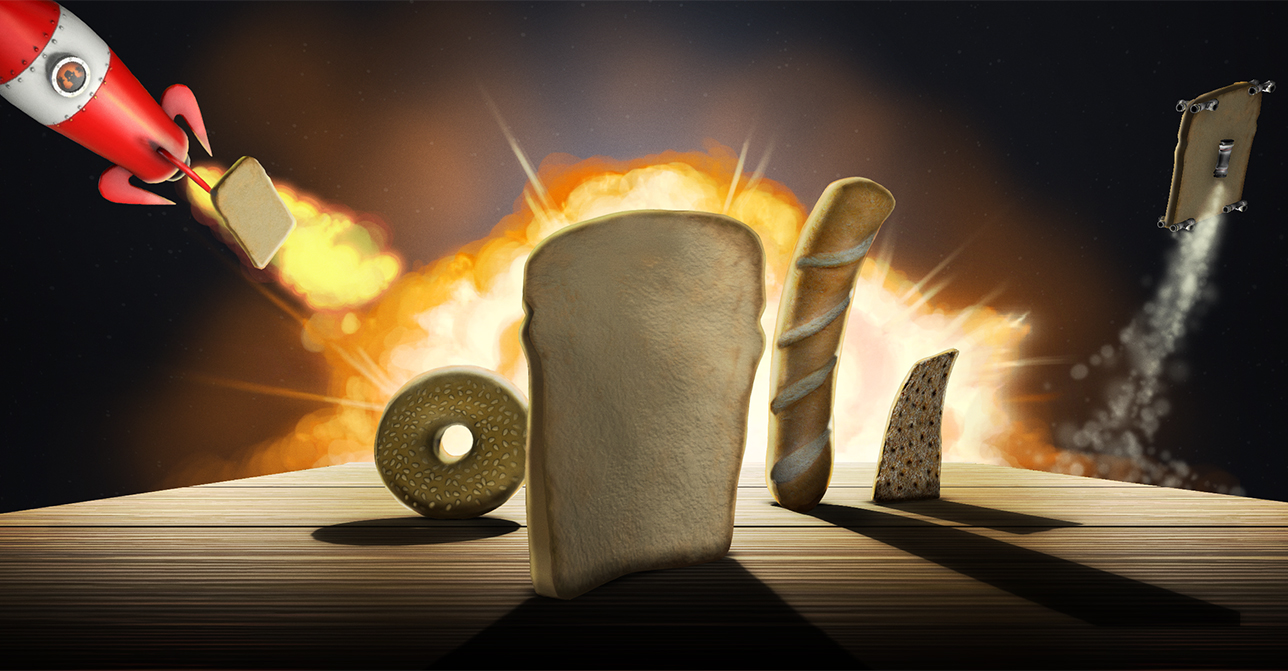Not worth the dough
I can only imagine how I am Bread came to be. I picture a couple of friends sitting around, drinking, when one says, “Man, wouldn’t it be funny if we made a game where you play as a slice of bread?” Then everybody laughs and nods, because it is funny right then in that moment.
But then somebody takes the joke and runs with it, actually spending the time to make the game. Through transition from idea to actuality, it stops being a funny joke. It can manage to be mildly entertaining at times, but it takes a lot of chewing to get to those parts.

I am Bread (Mac, PC, PlayStation 4 [reviewed])
Developer: Bossa Studios
Publisher: Bossa Studios
Released: April 9, 2015 (Mac, PC), August 25, 2015 (PS4)
MSRP: $12.99
I’m glad I stuck with I am Bread until the end. There was a point about halfway through when I considered giving up. I was spending a lot of time getting to the end of a level and then failing and having to start from the beginning. I was constantly fighting the camera in addition to the controls. I just wasn’t having any fun. Eventually, it gets better.
As a slice of bread, each of the four corners is assigned one of the shoulder buttons. Holding one of the buttons will make that corner stick to a surface. By alternating which corners are anchored, the bread can walk, climb, and even jump. The big problem I faced early on has to do shape of the bread. It is essentially a rectangle, and it is constantly flipping and rotating. Though the corners are labeled with their corresponding buttons, it doesn’t feel intuitive. Sometimes the top left corner on screen is controlled by L1; sometimes it’s controlled by R2.
After spending more time with it, some nuance does show up. Since it’s cut from a loaf of bread, the slice has two rounded corners; those are always L1 and R1. Also, since the length and width of the slice aren’t equal, orientation can be manipulated in order to increase or decrease stride. There is room for impressive maneuvers to be performed, but man is it hard to get to that point.
Even after coming to terms with the unintuitive controls, I never felt quite comfortable with the camera. It’s always sluggish to respond, it doesn’t allow any zoom control, and it’s often clipping through walls and objects in tight quarters.
The main goal in I am Bread is to become toast without getting dirty or wet. This means a lot of climbing along walls and across furniture. It isn’t always clear what surfaces are safe. Toenail clippings on a pillow (ew) are hard to spot, and moldy walls aren’t clearly delineated from clean walls. Getting to the end of a level with 100% edibility takes some trial and error.
It is somewhat open in that there are multiple paths across an area and occasionally there are multiple heating elements available for toasting. It’s a bit of a missed opportunity for organic difficulty scaling; I can imagine there being a fast-but-difficult route to complement the slower-but-easier route. As it is, there doesn’t seem to be any obvious structure.

Though the story mode was more frustrating than fun for me, the additional modes add their own twists along with new bread types. Bagel Race switches in a round rolling bagel, adds cardboard race track pieces to the levels, and has players hitting checkpoints as quickly as possible. Rampage uses a baguette, which features simpler two-button control as it tries to smash as many plates and vases as possible in a strict time limit. Cheese Hunt features cracker bread, which is more rigid and is prone to breaking, as it focuses more on exploration. Finally, Zero G adds rockets to each of the bread’s four corners, allowing for total control in the zero gravity environments.
As much as I didn’t particularly like the plodding, frustrating story mode, I can’t help but be impressed by how differently each of the additional modes plays. All of them are difficult to control, but I ended up finding some enjoyment in Bagel Race and Zero G. Fortunately, every mode is available from the start.
Still, when I think about I am Bread as a whole, I’m reluctant to say it’s good. It’s a silly idea and it seems like developer Bossa Studios had a lot of fun building all of the different modes, but I wish I were having that much fun playing it.
[This review is based on a retail build of the game provided by the publisher.]









